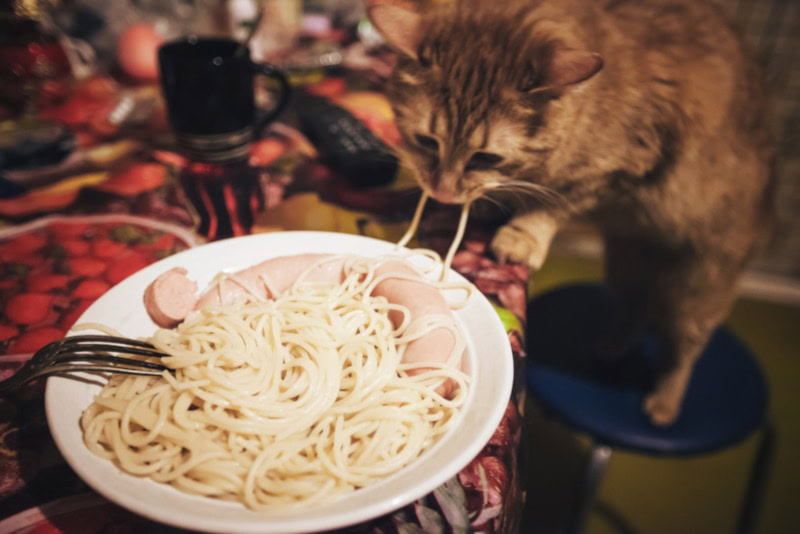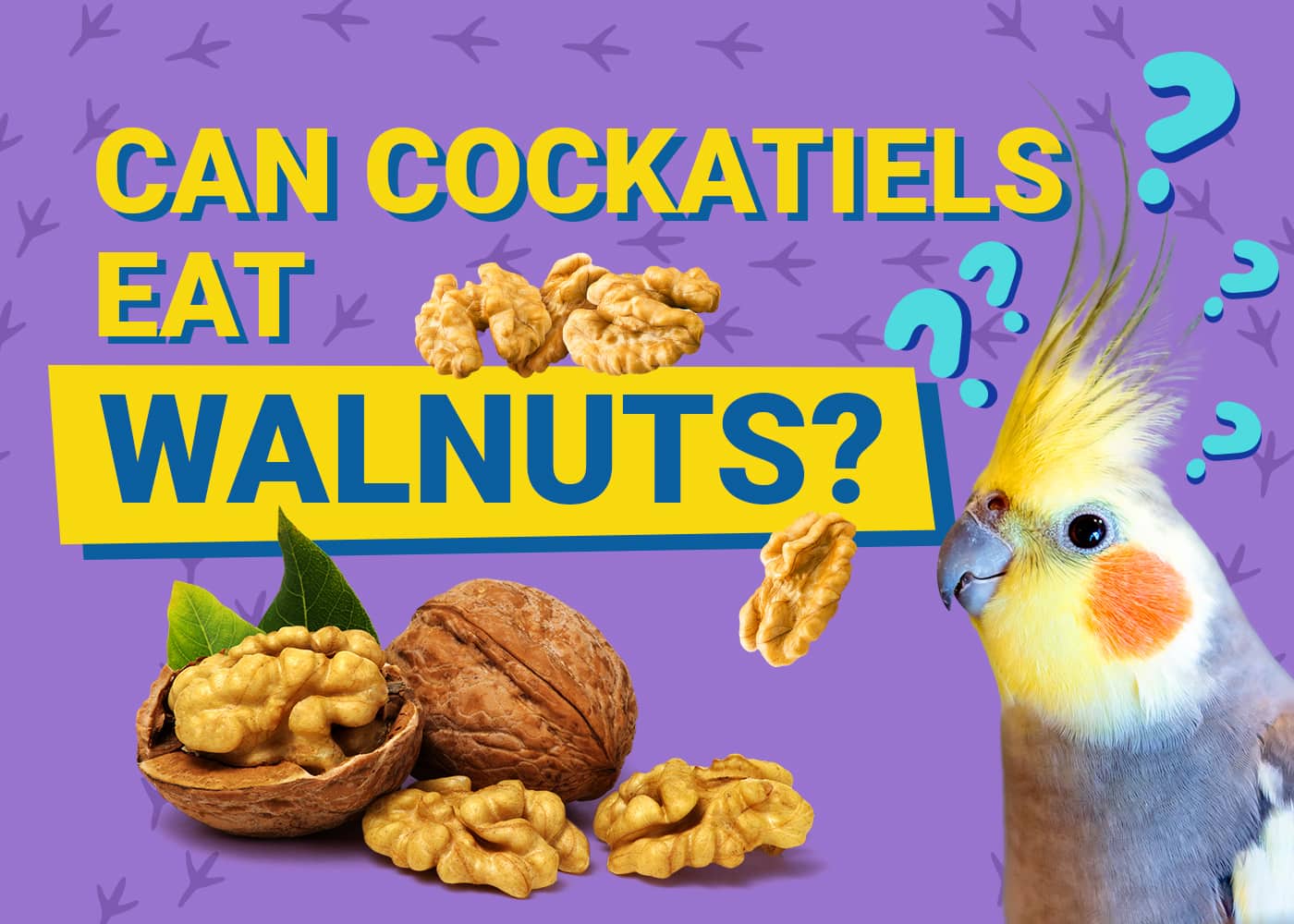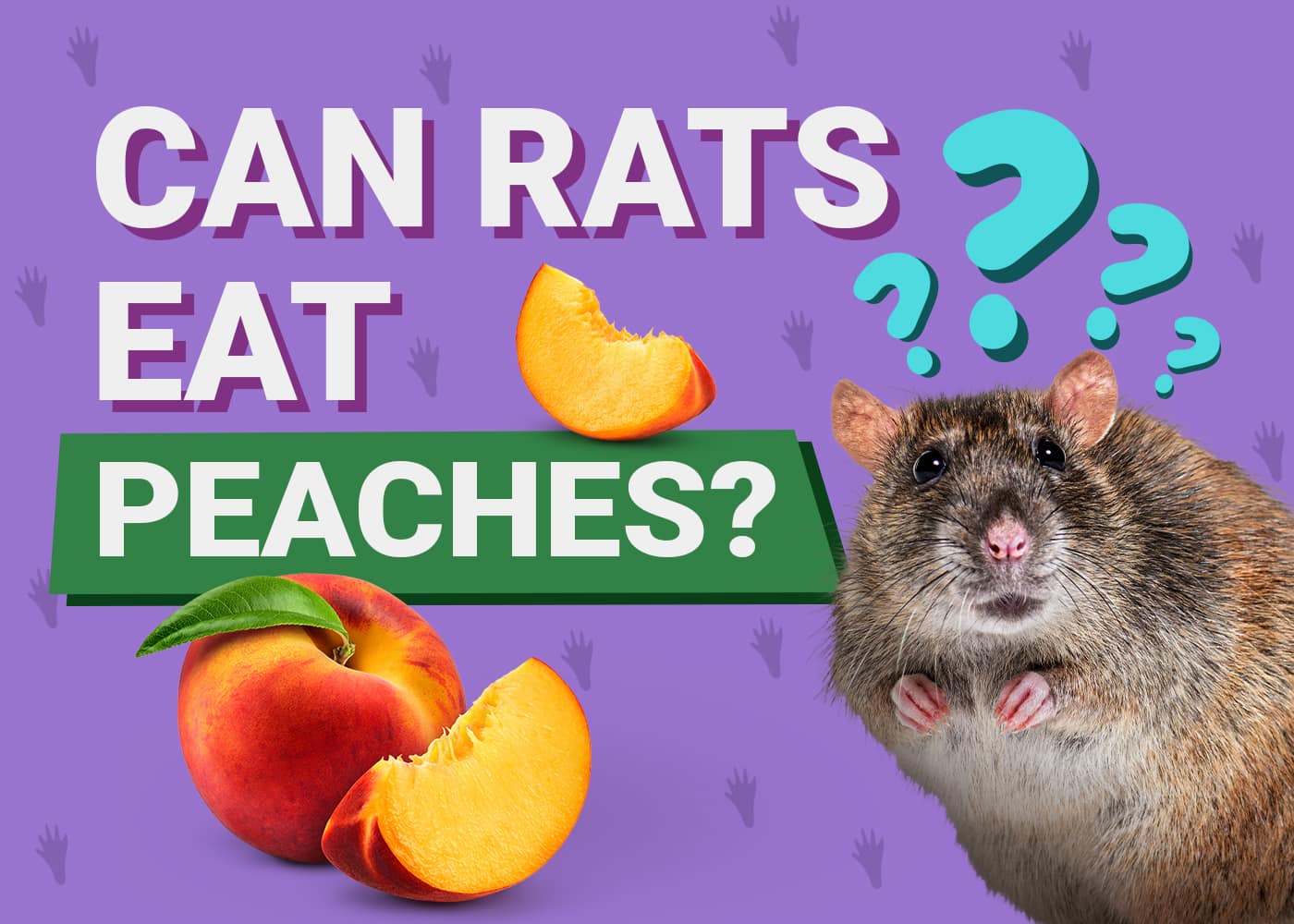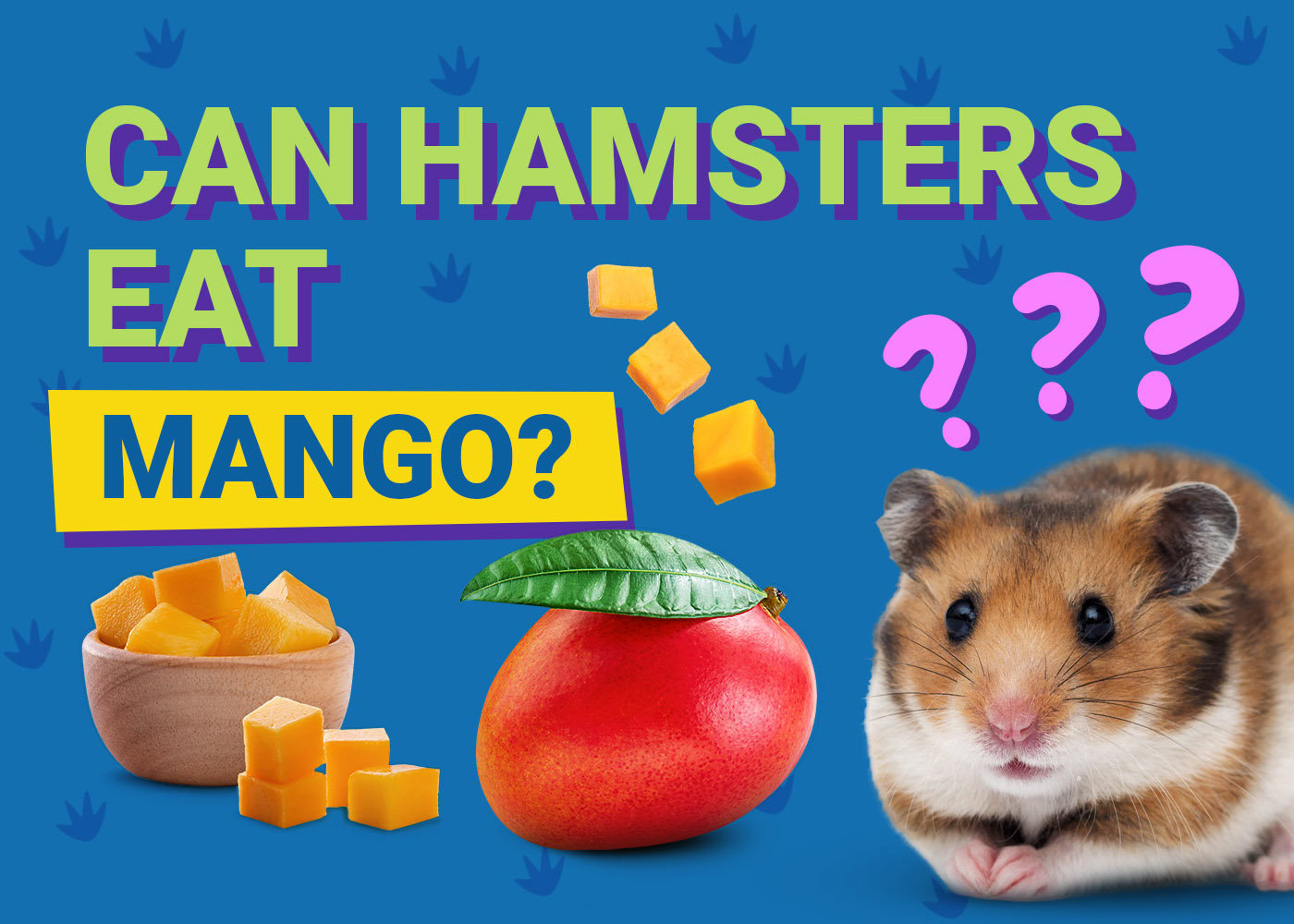VET APPROVED

The information is current and up-to-date in accordance with the latest veterinarian research.
Learn more »Who doesn’t love a big bowl of pasta? It is so delicious! What if one of our furry friends finds their way into the bowl to get a piece?
Pasta isn’t necessarily good for cats, but it should not cause any crucial health issues. Pasta itself isn’t dangerous to the cat, it’s more about how it is prepared.
The ingredients for pasta–flour, eggs, and water–are not toxic for cats. Eggs provide a bit of protein. Flour, however, is a carbohydrate ingredient that doesn’t add any nutritional value to the cat’s diet.

Can Cats Eat Uncooked Pasta?
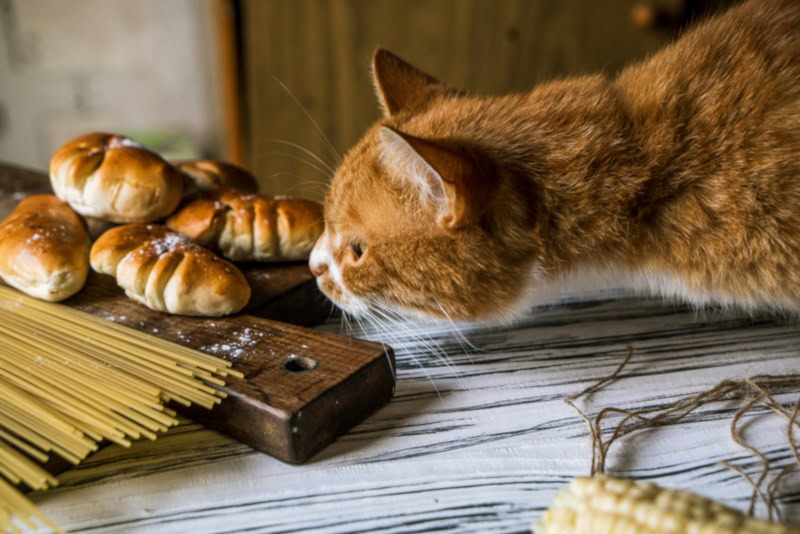
Whether you are making pasta from scratch or have a bag open on the counter, your cat may become interested in what you are cooking and want to try a bite.
The pasta itself and its ingredients aren’t toxic to the cat. The shape of pasta also won’t affect your cat because of its soft texture, however, it is likely your cat will suffer stomach upset, indigestion, and maybe even constipation.
Besides being difficult to digest, the flour starch pasta is made from won’t provide any nutritional value for your cat. So, it’s best not to feed it to them regularly. Cats are carnivores, so they should be getting their nutrition from protein, such as fish or Chicken.
Protein deficiency is a serious condition among cats and can lead to other dangerous health problems.
If you plan to feed your cats human food, make sure they are always getting healthy options like salmon, chicken, or even a bit of plainly cooked meat, they can eat the occasional piece of fruits, and veggies. However, certain types of cheese are not good for them. But, more on that later.
Pasta, like other grains, does not provide the essential amino acids that cats need to live.
Even though pasta isn’t considered a healthy option for your cat, sharing a small piece isn’t going to harm your feline. But, it must be served plain. No sauce! Those can be too acidic, creamy, and high in fat.
Also, it can lead to health problems like obesity and other weight-related issues. Certain cats may get GI issues, such as diarrhea. There is also a rare chance your cat is allergic to wheat.
In that case, they definitely shouldn’t be eating pasta.

Can Cats Eat Pasta or Rice?
Plain pasta is OK for cats to eat, but it doesn’t do anything for them nutritionally. Rice, however, is easier for cats to digest.
It can help cats if they are suffering from an upset stomach. It is less likely to result in severe stomach pains, vomiting, and constipation.
Sometimes, even cat foods list rice as one of their ingredients. We prefer to recommend feeding cats meat proteins as that is a species-appropriate diet.
If you want to serve rice to your cat, make sure it is cooked. Uncooked rice can cause health problems for your cat. Don’t serve it with seasoning or sauces. Just make sure you put it with some plain boiled chicken to provide a protein source and consider adding some cat-friendly vegetables.

Can Cats Eat Spaghetti?
Some ingredients and sauces found in many different popular pasta dishes, like spaghetti, can be harmful to cats. These include garlic, onion, and other spices. Any food high in carbohydrates, especially sugar, and fat is not going to be a great food option for your cat.
It can be toxic to their stomachs and upset them.
Spaghetti is high in carbohydrates and a cat’s diet should consist mostly of protein. Eating too much spaghetti could cause digestive problems and nutritional deficiencies in your cat.
Offering it as an added treat could also cause obesity. If you buy spaghetti from a can, it usually contains ingredients that are bad for felines.
Can Cats Eat Dry Spaghetti?
The short answer is, no. Cats should never be offered or be able to eat raw spaghetti. Their tiny bodies can not handle uncooked noodles. They could experience bad digestive discomfort. Dry pasta absorbs moisture and swells, if ingested the pasta can soak up gastric juices and expand, potentially causing discomfort or bloating. Although unlikely, this could even put your cat in the risk of a blockage.
They can also choke on the small pieces of pasta. If your cat does accidentally eat some, contact your local veterinarian for guidance and watch out for signs of stomach problems.
Can Cats Eat Cooked Spaghetti?
Don’t worry too much if you see your cat sneak a bite or two of plain, cooked spaghetti. But, don’t make it a habit!
Because most of the toxic ingredients are in the sauces and add-ons, your cat should be fine to eat some cooked spaghetti noodles. However again, it is not ideal for them so if this happens, just keep an eye out for any signs of gastrointestinal distress and make sure you call the vet if you notice something of concern.
Can Cats Have Spaghetti Bolognese?
Good news! A cat can eat cat-safe versions of spaghetti bolognese, which are prepared basically by mixing meatballs and onion-free tomato sauce. But the noodles themselves, like all other pasta dishes, do not have any nutritional value. Consider the dish a treat.
Bolognese sauces made for human consumption have lots of garlic and onion and can hurt your cat so it is best to skip them. Even though there is some meat in the sauce, artificial sauces have preservatives inside of them that may be toxic to your cat.

Can Cats Eat Noodles?
Cats can eat noodles, but they do not have much nutritional value.
However, not all kinds of noodles are safe for cats to eat.
If a noodle contains monosodium glutamate or is flavored with teriyaki or lobster sauce, don’t feed it to your cat. Those can be harmful to their stomachs and cause vomiting or diarrhea.
Cats can eat noodles that are made with whole-wheat flour, eggs, and water. But again, these do not offer any nutritional value to them and are likely to cause digestive upset, so there is no good reason to feed them to your cat.
Can Cats Eat Ravioli?
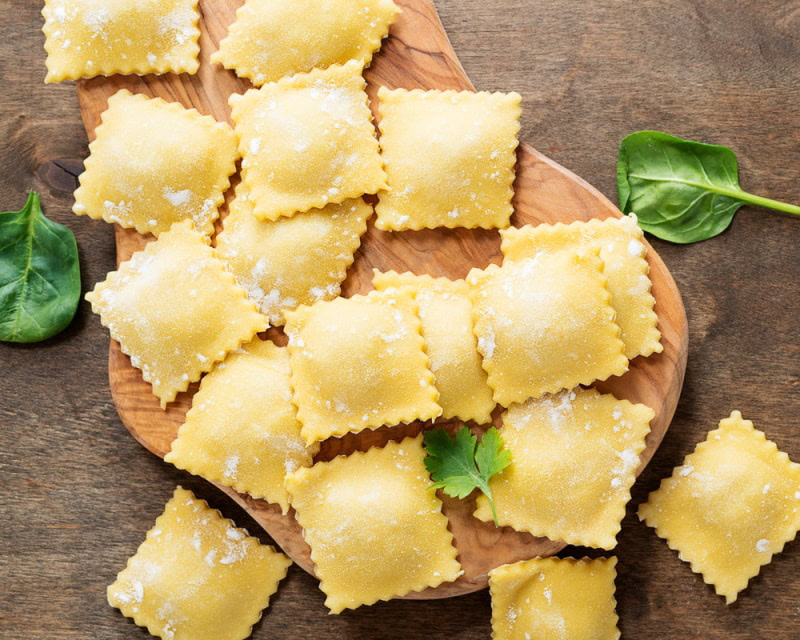
Cats should not be fed ravioli because their digestive systems are not made to digest large amounts of cheese and other dairy products efficiently. Digesting lactose is not something they can do. So, it is best to avoid giving them the cheese, sauce, and all other add-ons that may come with it.

Can Cats Eat Macaroni?
Like all other noodles, the answer is it won’t kill them but it won’t help them either.
Macaroni noodles are no different in that sense. They don’t have a lot of nutritional value and they aren’t considered healthy for the cat.
If a cat eats too much macaroni, it could experience digestive and weight problems. However, if your cat sneaks a noodle or two, there shouldn’t be anything to worry about.
- NO MESS - The 360° tray on this cat food and water bowl set has a raised design to catch and...
- WHISKER FRIENDLY - Shallow and wide metal containers with flat bottoms ensure your kitty can enjoy...
- CHEW-SAFE MATERIALS - Kittens and cats love chewing on silicone and soft rubber - but it's a choking...
Knowing exactly what your feline companion can and cannot eat will help you become the best pet parent. Recognizing that not all cat bowls are equal is also key! The Hepper NomNom Cat Bowl sets itself apart from traditional options by catering to the specific needs of cats. The innovative design offers whisker relief via shallow dishes and promotes digestion with a slight bowl elevation. Find out if the Hepper NomNom is right for your cat by clicking here.
At PangoVet, we’ve admired Hepper for many years and decided to take a controlling ownership interest so that we could benefit from the outstanding designs of this cool cat company!

Can Cats Eat Mac and Cheese?
You should avoid feeding your feline foods that have cheese, cheese sauces, and other forms of cooked cheese. Mac and cheese is a dish that is high in fat and carbohydrates.
As a hypercarnivore, your cat will get all the nutrients they need from a vet-approved meat-based diet. Their stomachs are just not equipped to handle digesting cheese.
So, they technically can eat mac and cheese, but that certainly does not mean that they should.
What if you make the mac and cheese with non-dairy cheese? That still is not good for the cat. It is not better than regular dairy cheese. Non-dairy cheese is still high in fat and salt, which is a disaster for a cat’s health.
Some humans can secrete the lactase enzyme that helps break down the lactose in dairy products, like cheese. Adult cats, however, don’t naturally produce that enzyme.
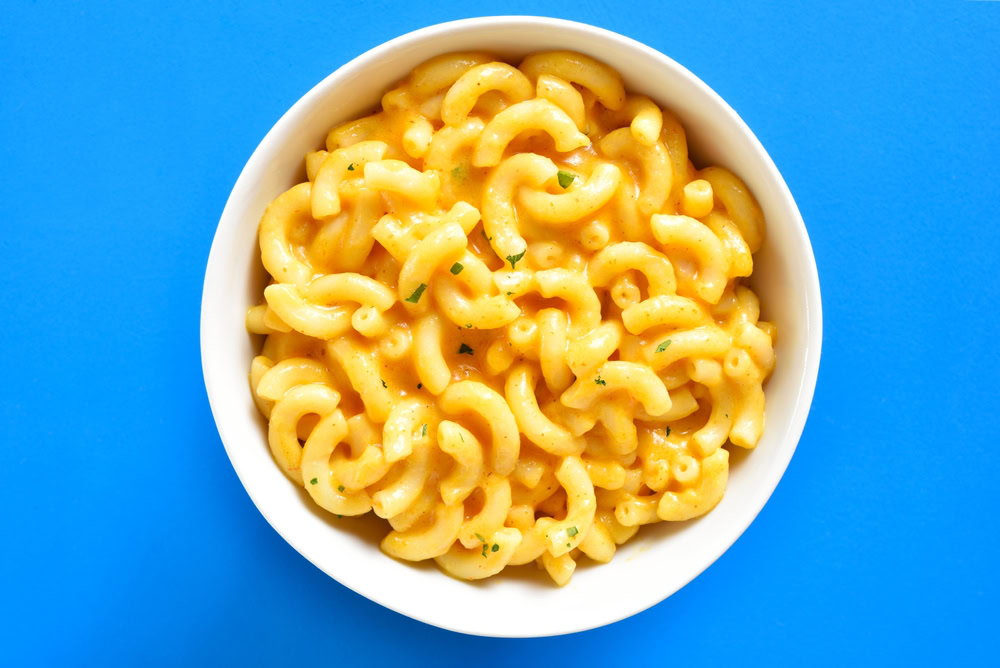
Is Macaroni and Cheese Good for Cats?
No, macaroni and cheese are sadly not good for cats. This dish is a human favorite! Unfortunately, our little furry friends stay clear of it.
You should always avoid feeding your cat cheese and cooked cheese. If they do ingest it, they can suffer weight problems, and digestive issues and may have to take a trip to the vet.
Can Puppies Eat Mac and Cheese?
If cats can’t eat mac and cheese, what about dogs? Even though they may be tempted by the smell, puppies should not eat mac and cheese. It’s the same with cats in this sense.
Mac and cheese are not a healthy option for puppies. The seasonings, salt, and oils are harmful to the dogs. They can cause tummy aches and other digestive issues. If the puppy is allergic or intolerant to gluten or dairy, the mac and cheese can do even more damage.
Many dogs, like some humans, are also lactose intolerant. This means that they do not naturally make the enzyme that breaks down milk the sugar called lactose. This means that
The undigested lactose builds up inside their intestines, it is then fermented by bacteria causing excessive gas, discomfort, and may even. result in vomiting and diarrhea.
If your dog can handle other dairy products, you may be able to get away with a tiny bite of mac and cheese. It’s sad to say, but it’s probably better to keep them away from the delicious dish.
Featured Image Credit: e-leet, Shutterstock
